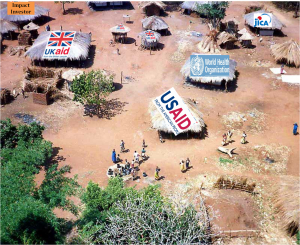Developing countries need a democratization of development aid.
Not the democratization of giving that Bill Clinton or Jeffery Sachs called for, but a democratization that is realized through a real and balanced collaboration between international aid disbursing organizations, local organizations and local communities that receive aid; a collaboration that moves receiving organizations, communities, and countries away from donor dependency. Too often, donor imposed solutions stunt local ownership by imposing foreign goals. Aid disbursing organizations must create structures that enable and empower local actors to design, implement, evaluate and maintain development programs. Governments, multilateral institutions and private foundations that fund development must improve upon their traditional partnerships with governments, nongovernmental organizations and nonprofits to create partnerships that include the intended beneficiaries of development aid.
Why Talking About Development Aid?
Ideally, local people will design, implement, evaluate, maintain and fund their own development programs, allowing them to develop their countries without the influence of foreign agendas. However, poverty and bad governance make many local communities depend on foreign funding. Dambisa Moyo and other pro-market economists have argued that foreign aid has fostered dependency, fed corruption and perpetuated poverty and bad governance. Moyo argues that development aid should be replaced entirely with foreign direct investment and other financial mechanisms. Despite the evidence supporting her position, we will probably not see the end of foreign aid in our lifetimes. Many people see aid as a form of charitable giving, which is deeply rooted in the practices and belief systems of many of the world’s major religions. Furthermore, development aid has a long history of being used by nations to advance their foreign policy and economic objectives. For example, the mission of the United States Agency for International Development (USAID) includes advancing American security and prosperity.
How Can We Improve the Aid System?
If aid is to remain as a mechanism for development, then it must become more democratic. To accomplish this, aid-sponsored programs must:
- Cultivate Local Ownership of Development by creating a system of delivering development aid that engages local actors throughout the aid-sponsored development process. This necessitates organizational and program structures that enable and encourage local actors to participate throughout the decision-making process. The World Bank’s community driven development (CDD) projects in Kyrgyzstan, Myanmar, Romania and Benin engage local actors in national, regional and local governments, nonprofits and NGOs. In these CDD projects, local actors create goals for their communities’ development and the World Bank funds these projects according to the local communities’ priorities. Local and Community Driven Development, a World Bank analysis of CDD, states that CDD programs have demonstrated effectiveness in improving incomes, governance capacity and people’s empowerment.
- Build Capacity to increase local participation and prepare organizations, governments and individual actors to operate without aid. According to the United Nations, World Bank, International Monetary Fund and other multilateral development agencies, capacity building is vital to reducing poverty and increasing health in developing countries. Development aid that funds capacity building is an investment in local, regional and national leaders that enables them to effectively manage and direct the development of their countries.
- Fund Income Generating Activities (IGAs) because they can reduce local nonprofit and NGO dependency on foreign aid by creating a valuable income stream that, unlike foreign aid, is not politicized or contingent on following donors’ directives. IGAs range from charging clients symbolic fees, charging higher income clients a fee to subsidize services for lower income clients to non-mission centric business endeavors. They are a means to enhance the efficiency and effectiveness of nonprofits and can help sustain nonprofits and NGOs during times of economic turmoil when donations decrease.
- Adjust Timeframes for Program Planning, Implementation and Evaluation to accommodate working with more local stakeholders. A more democratic approach to aid necessitates working with more local stakeholders, which may slow the planning and implementation stages of a development program. After observing this in their CDD programs, the World Bank has increased the timeframe for CDD project planning and implementation. The World Bank has also observed that these more democratic development projects tend to have longer-term impacts. Evaluation of these projects must therefore be expanded in order to capture their full impact.

